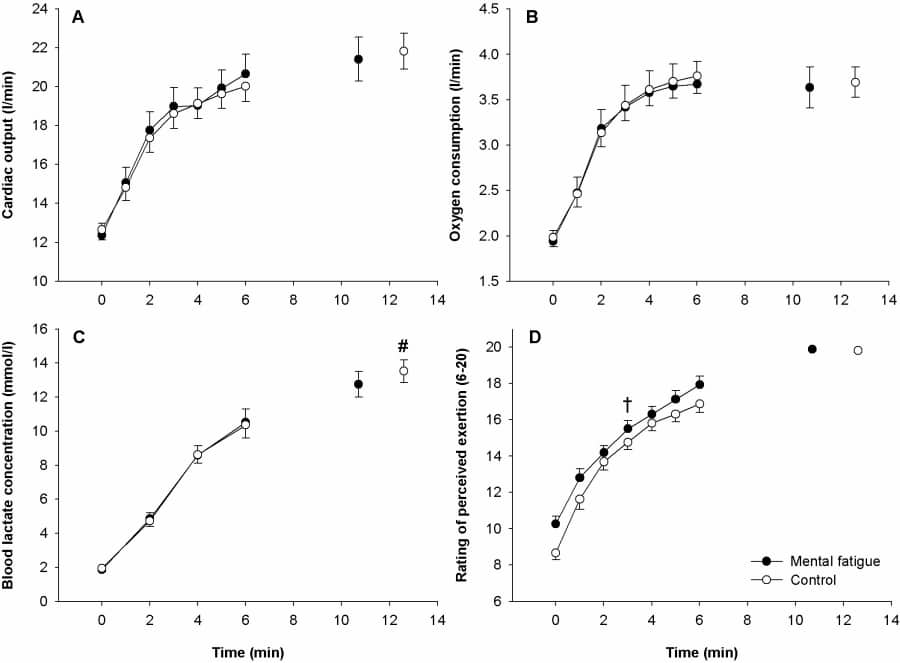Mental fatigue refers to the subjective (e.g. tiredness) and neurophysiological effects of prolonged and demanding cognitive activity (1). Although the negative consequences of mental fatigue on cognitive performance are well known, its effects on physical performance are unclear. In the present randomised, counterbalanced, cross-over trial, we induced mental fatigue in 16 healthy, fit young adults with a prolonged (90 min) and demanding cognitive task (the AX-continuous performance task) known to activate the anterior cingulate cortex (ACC) (2). The control treatment consisted of watching documentaries about cars and trains for 90 min. Manipulation check with a mood questionnaire confirmed a state of mental fatigue after experimental treatment compared to control (P = 0.005). Fifteen minutes after each treatment, subjects warmed-up for 3 min and then cycled at 80% of peak power output on a stationary ergometer until exhaustion. Performance in this physical task (i.e. endurance performance) was measured as time to exhaustion (mean ± SD) which was reduced in the mental fatigue state (640 ± 316 s) compared to control (754 ± 339 s) (P = 0.003). There were no significant differences between treatments in cardiac output (Fig. 1A), oxygen consumption (Fig. 1B), and blood lactate concentration (Fig. 1C) during cycling. Lactate at exhaustion was actually higher after control treatment (P = 0.032). Therefore, the physiological factors commonly assumed to limit endurance performance (3) could have not mediated the negative effect of experimental treatment on time to exhaustion. Similarly, self-reported success motivation and intrinsic motivation related to the physical task did not differ significantly between treatments. The negative effect mental fatigue on endurance performance seems to be mediated by the significant increase in perceived effort required by the physical task (P = 0.007 at isotime) (Fig. 1D). Ratings of perceived exertion at exhaustion were similar between treatments. These findings are in accordance with Brehm’s motivational intensity theory (4) which predicts that people disengage from a task when the effort required surpasses the maximum level of effort they are willing to invest for succeeding in that task. Neuroimaging studies in humans are necessary to investigate whether this effort-related decision-making process is associated with altered ACC activity (5). In conclusion, the present study provides experimental evidence in favour of the hypothesis that brain function can limit endurance performance independently of cardiovascular and metabolic alterations.
University of Cambridge (2008) Proc Physiol Soc 11, C94
Oral Communications: Mental fatigue impairs physical performance in humans
S. Marcora1, V. Manning1, W. Staiano1
1. School of Sport, Health and Exercise Sciences, Bangor University, Bangor, Gwynedd, United Kingdom.
View other abstracts by:
Effects of mental fatigue on physiological (A B C) and perceptual (D) responses to intense cycling exercise to exhaustion. Data are presented as mean ± SE. # significant (P < 0.05) paired t-test; † significant main effect of treatment at isotime by repeated measure ANOVA; all main effects of time are significant.
Where applicable, experiments conform with Society ethical requirements.

